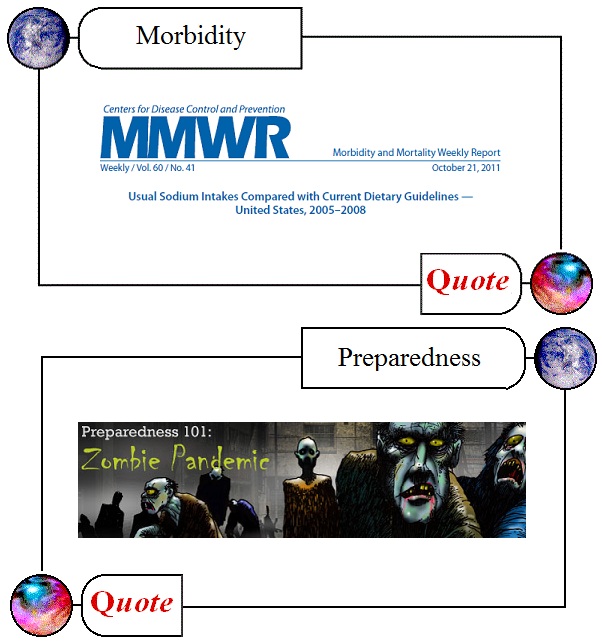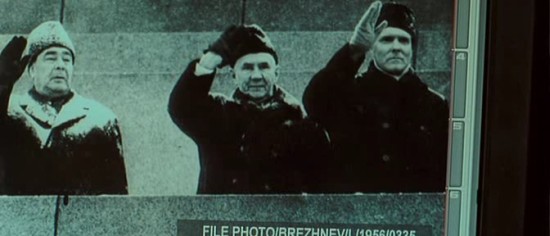[Reposting] Talking the audible talk
Wednesday, October 26th, 2011[ previous version deleted for tech reasons, now reposted — pls comment if you were unable to do so before ]
[ by Charles Cameron — importance of suiting language to intended audience, importance of graphics, Tajikistan, Yemen, importance of poetry in conflict and conflict resolution ]
.
Et voila! Two publications issued this month by the Centers for Disease Control.
I’ve already stated the two lessons that I think we can draw from these, in the parenthetical header where I try to warn ZP readers of the approximate through-line and likely detours of each of my posts:
- graphics, graphics, graphics!
- talk the talk your intended audience can hear!
But why?
Of course I’m mildly amused at the CDC using zombies — just like Daniel Drezner — to get a serious point across. And I like the play between the seriousness of the Morbidity Report and the morbid fascination of the undead…
But I am going somewhere with all this, and on this occasion the CDC’s sense of presentation is the detour, and my through-line leads to the importance of poetry in conflict resolution.
*
I want to borrow a story from the keynote speech delivered by John Paul Lederach at the Association for Conflict Resolution’s 2004 Conference, as told to him by a Tajik professor named Abdul:
“I was tasked by the government to approach and convince one of warlords, a key Mullah-Commander located in the mountains to enter negotiations,” Abdul begins. “This was difficult if not impossible, because this Commander was considered a notorious criminal, and worse, he had killed one of my close friends.” Abdul stops while the translation conveys the personal side of his challenge.
When I first got to his camp the Commander said I had arrived late and it was time for prayers. So we went together and prayed. When we had finished, he said to me, How can a communist pray?
I am not a communist, my father was, I responded.
Then he asked what I taught in the University. We soon discovered we were both interested in Philosophy and Sufism. We started talking Sufi poetry. Our meeting went from twenty minutes to two and half hours. In this part of the world you have to circle into Truth through stories.” In the hallway Abdul’s gold capped teeth sparkle with a smile as he relays his message: “You see in Sufism there is an idea that discussion has no end.”
His point well conveyed, the Professor picks up the story again.
“I kept going to visit him. We mostly talked poetry and philosophy. Little by little I asked him about ending the war. I wanted to persuade him to take the chance on putting down his weapons. After months of visits we finally had enough trust to speak truths and it all boiled down to one concern.”
“The Commander said to me, ‘If I put down my weapons and go to Dushanbe with you, can you guarantee my safety and life?'” The Tajik storyteller pauses with the full sense of the moment. “My difficulty was that I could not guarantee his safety.”
He waits for the translator to finish making sure I have understood the weight of his peacemaking dilemma and then concludes.
“So I told my philosopher warlord friend the truth, ‘I cannot guarantee your safety.'” In the hallway Professor Abdul swings his arm under mine and comes to stand fully by my side to emphasize the answer he then gave the Commander.
“But I can guarantee this. I will go with you, side by side. And if you die I will die.’ The hallway is totally quiet.
“That day the Commander agreed to meet the Government. Some weeks later we came down together from the mountains. When he first met with the Commission he told them, ‘I have not come because of your Government. I have come for honor and respect of this Professor.’ “You see, my young American friend,” Abdul taps my arm lightly, “this is Tajik mediation.”
Think about it. Think about the Yemen.
Consider that Steven C. Caton of the Center for Middle Eastern Studies at Harvard suggests:
Every day in the Middle Eastern country of Yemen, battles are being waged that don’t involve bombs, guns or even a raised fist. Rather in Yemen, where physical violence is considered an inferior form of honor-conflict, poetry is one of the preferred weapons of choice.
If Yemen is important to you — or conflict resolution — I have a question for you:
Are you fluent in poetry?
*
Your copy of the Zombie Pandemic awaits you here. For those more interested in Morbidity and Mortality Weekly, here’s the report.
Hat-tip to Tony Judge for his paper, Poetic Engagement with Afghanistan, Caucasus and Iran: an unexplored strategic opportunity?



 make for an exciting action film. Or perhaps a series of films along the lines of The Bourne Identity or those Tom Clancy movies with Harrison Ford. All well and good. But that is not why The Profession is worth reading – that’s merely why it is fun to read.
make for an exciting action film. Or perhaps a series of films along the lines of The Bourne Identity or those Tom Clancy movies with Harrison Ford. All well and good. But that is not why The Profession is worth reading – that’s merely why it is fun to read.



